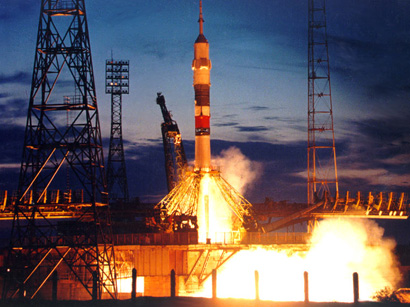Baku, Azerbaijan, April 18
By Elena Kosolapova - Trend:
Kazakhstan has a great past in space development, and its future in this field is expected to be just as glorious.
During the 20th century Kazakhstan was the place where Soviet specialists achieved breakthrough in the space sphere.
The world's first space launch facility called the Baikonur Cosmodrome was built on the steppes of the Kazakh desert. It was from these launch pads where the world's first orbital spaceflight Sputnik 1 and the first manned spacecraft in history Vostok 1 were launched, with Russian cosmonaut Yuri Gagarin.
These events took place over half-century ago. However the Baikonur Cosmodrome remains a busy space port with numerous commercial, military and scientific missions being launched annually. And Kazakhstan plans to transform into important space power using this space launch facility.
The Baikonur Cosmodrome is being leased by the Kazakh government to Russia until 2050 and is managed jointly by the Russian Federal Space Agency and the Russian Space Forces. Moreover Russia will likely work at Baikonur even after 2050, according to official statements from both countries.
In particular in early 2014 Kazakh Space Agency head Talgat Musabayev in an interview to the Russian newspaper Izvestia, said that Kazakhstan wanted Russia to remain at Baikonur forever and expressed interest in implementation of joint strategic projects in space industry in the future.
In fact, nowadays Kazakhstan has not enough specialists to develop the cosmodrome on its own. Moreover its maintenance requires huge investment and Kazakhstan needs partners to share this financial burden. Thus the main task for Kazakhstan now is to get Russia's experience in space industry, where it achieved some progress but much remains to be done.
In late 2013 the two countries signed an agreement increasing Kazakhstan's control over the facility. The agreement envisages joint operation of Baikonur and more active involvement of Kazakh specialists into space projects implementing at the cosmodrome.
Earlier Russia's full control over the cosmodrome partially hindered its development. Russia was not sure about its future at Baikonur and did not want to invest a lot in new long-term projects outside its borders. Much was invested in the construction of Vostochniy Cosmodrome in Siberia instead. Kazakhstan in turn was not interested in spending money on projects run by Russia. This situation resulted in several-years delay in construction of the rocket complex Baiterek at Baikonur. The parties agreed on its creation in 2004, but could not decide on its financing for a long time. The new agreement which defined rights and duties of both parties at Baikonur will hopefully resolve this problem.
Surely, active involvement of the country into the space industry will entail more expenditure. But Kazakhstan which soil is rich in hydrocarbons, uranium, iron, aluminium, copper, silver, gold, coal and other natural resources can afford such costs. Besides Baikonur has potential to compensate all the investments. In particular Kazakhstan plans to attract millions of tourists to the cosmodrome. Baikonur is expected to become one of the tourist landmarks during EXPO exhibition which will be held in Kazakhstan in 2017. In long term-prospect the country plans to develop space tourism at Baikonur which could give huge revenues to the country. The first space tourist American multimillionaire and one of Microsoft cofounders Dennis Tito paid $20 million for its flight in 2001. The last space tourist Canadian entrepreneur, co-founder and CEO of Cirque du Soleil Guy Laliberte reportedly paid some $35-40 million for its flight in 2009. The orbital space tourism was halted in 2010 due to the increase in the International Space Station crew size, using the seats for expedition crews that would be sold to paying spaceflight participants. However, tourist flights are tentatively planned to resume and they will be even more expensive in near future, according to experts. The number of people willing to fly to the space is not dropping but rising though.
Moreover Kazakhstan will be able to get money from foreign spacecrafts and satellites launches from the cosmodrome in future. Fore example, Russia's revenues from space activities are comparable with the proceeds from arms exports.
In general Kazakhstan has already achieved great goals in space industry. It became the fist post-Soviet country (excluding Russia) which launched its own space satellite. KazSat was launched on June 18, 2006. The second Kazakh space satellite was launched in July 2011. KazSat-2 operates in the normal mode, provides services to 11 Kazakhstan operators and gets over $2 billion tenge (about $11 millions) for its services. Over 63 percent of its capacity has been already leased. The third Kazakh satellite KazSat-3 has been already delivered to Baikonur and will be launched by April 30. Kazakhstan plans to sell its telecommunication services to neighboring countries.
One more ambitious Kazakhstan's aim is to send its astronaut to the International Space Station (ISS). The idea was proposed in 1994 by Russian and Kazakh cosmonaut Talgat Musabayev. In 1999 Russia agreed to help Kazakhstan in this issue. Kazakhstan created its own Cosmonaut Corps and planned to send its astronaut to the International Space Station in 2009. Two Kazakh cosmonauts Aydin Aimbetov and Mukhtar Aymahanov were trained and completely prepared for the flight. However Kazakhstan was forced to cut its space budget and delay implementation of these plans due to financial crisis. Now the country reverted to this intention. In April Russian news agency ITAR-TASS reported with the reference to Kazakh National Space Agency's deputy head Yerkin Shaimagambetov that the country was negotiating this issue with Russia. The country plans to realize this intention in 2016-2017.
In short, Kazakhstan has huge ambitions in space and its achievements in a number of other spheres of the economy over the last years show that it is quite persevering in meeting its goals. Besides the country has good infrastructure, location, legacy, enough recourses and an experienced partner to make a reality of these plans.






